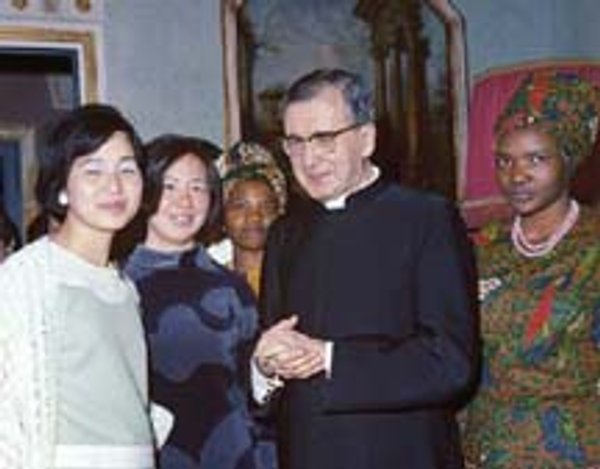This year marks an important anniversary for Opus Dei: Blessed Monsignor Josemaria Escriva de Balaguer y Albas, its founder, was born 100 years ago, on January 9, 1902. Most remembered for his spiritual paternity, Blessed Escriva's reputation for sanctity has grown and spread throughout the world. On the occasion of Monsignor Escriva's beatification on May 17, 1992, Pope John Paul II stated, "With supernatural intuition, Blessed Josemaria untiringly preached the universal call to holiness and apostolate."
Opus Dei (Latin: God's work), a personal prelature of the Catholic Church founded in 1928, currently numbers more than 80,000 members worldwide comprising people of all walks of life and all social classes. Blessed Escriva defined the essential characteristic of the spirit of Opus Dei as "not taking anyone out of his place. Rather it leads each person to fulfill the task and duties of his own state, of his mission in the Church and society, with the greatest possible perfection." Members, through a solid formation, are encouraged to work according to the spirit of Jesus Christ with maximum competence, thus contributing to the sanctification of the world, by making the Gospel present in all human endeavors.
Unity of life was an expression frequently used by the founder of Opus Dei, and sums up his deep understanding of Christian life. He defined it as "an essential condition for those who are trying to sanctify themselves in the midst of the ordinary situations of their work and of their family and social relationships."
Blessed Josemaria explained that Christians working in the world should not live "a kind of double life. On the one hand, an interior life, a life of union with God; and on the other, a separate and distinct professional, social and family life."
"There is just one life, made of flesh and spirit. And it is this life which has to become, in both soul and body, holy and filled with God."
Some of the prelature's social undertakings were presented during one of the first celebrations commemorating the founder's centenary, which took place in Naples, Italy. They include the Elis Center of Rome which has formed 20,000 young people since 1965, the Ayala Foundation in Manila for technological advancement, the hospital of Monkole in Kinshasa, Democratic Republic of Congo, for social assistance, the University of Piura, Peru, for the defense of people's right to independence, and in Lagos, Nigeria, a school for technical training.
The Institute for Industrial Technology (IIT), established in March of 2000 in Lagos, Nigeria, is looked upon as a centennial "birthday present" for Blessed Josemaria. The Institute aims at imparting technical skills and knowledge with ethical values to non-matriculated youth and to underprivileged adult workers. Its enrollment extends to people from all tribes and religions.
Metro Achievement for Girls, a supplementary education program offered to Chicago's inner city girls, is another initiative based on the spirit of the founder of Opus Dei. Launched in 1985, Metro's success is no secret with the city's educational and business community today. With a focus on instilling virtue, students are taught critical academic and workplace skills and consequently enter the workforce with a true spirit of service and character.
Last December, John Paul II approved the decree on a miracle attributed to Blessed Escriva involving the healing of a Spanish physician from an incurable disease, thus giving the go-ahead to the founder's canonization, which will take place at the Vatican on October 6th.
This article has been re-printed with the permission of Living City, a magazine published by the Focolare Movement Women's Branch. The Focolare Movement's internet address is www.focolare.org.
